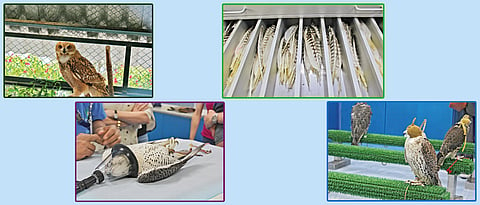

I tiptoe into the air-conditioned room. Sweat beads on my forehead, which I nervously wipe off. The hunters around me cannot sense my presence. They are blindfolded by hoods. On the 11 artificial perches on both sides of the aisle in the operation room sit 22 falcons — the fastest animals on Earth, and the birds of the Bedouins. I am in Abu Dhabi Falcon Hospital, the first public facility in the country dedicated to providing medical care to falcons.
The nomadic desert communities kept falcons to help them with hunting. With sharp eyesight and lightning speed, these birds soared through the sky preying on desert birds like the houbara bustard, reptiles and mammals like the gazelle. They enabled the Bedouins to have fresh meat. Falcons are now the national bird of United Arab Emirates and falconry, as a sport, has become popular with the sheikhs of Emirates.
In the operation theatre, the patients wait quietly. The veterinarian picks up Azam, a three-year-old male Peregrine falcon, and lays it on an operation table. He places an anaesthesia mask over its head and in a few seconds Azam goes to sleep.
In the race for survival, wild falcons have to struggle and fight every day. But falcons bred in captivity live in luxury. They don’t face the same hardships as their wild brethren, but have a different sort of problem. Their comparatively sedentary lifestyle leads them to end up with long and sharp talons, causing them discomfort and even injury.
The vet carefully trims its long and sharp talon tips, removes scabs from its feet and gently massages an anti bacterial crème. A bronze coloured ring shimmers on one of its legs. This ring, coupled with a microchip under its feathers, has information about it as well as its owner. The data is also used in Azam’s passport.
Yes, falcons of the sheikhs have their own passports. In UAE, the sheikhs own Peregrine (the fastest), Gyrfalcon (the largest), and Saker breed of falcons. Unlike other pets, they are not put in cages during air travel; rather, they sit right beside their owners with their hoods on. They often travel abroad in business class categories of airplanes to countries like Kazakhstan and Pakistan to participate in hunting competitions, a sport revered in UAE but restricted to its soil.
Azam’s eyes are still closed when the doctor tenderly spreads open its wings and examines its feathers. While the bird lies unconscious, he pulls open a drawer. His eyes dart across as he scrutinises the contents — feathers of different shapes and sizes neatly compartmentalised. He makes a selection and, using needles and a little glue, fixes it to Azam’s wing, replacing one that was damaged.
The feathers inside the drawer are collected from the facility’s moulting enclosures. During the moulting season every year, which lasts from March to September, falcons shed their feathers. The Falcon Hospital of Abu Dhabi has air-conditioned moulting tents with perches and sand flooring, where the raptors can stay for weeks and months as per the owner’s wishes and budget. The feathers that the moulting birds drop within these tents are then collected and reused.
“Falcons attack prey from behind and kill with their beaks,” says the doctor while removing the anaesthesia mask and scruffing the raptor. He examines Azam’s beak and tomial tooth — the lethal weapon with which a falcon strikes on its prey’s spinal cord. A filing tool is used to groom Azam’s beak. The 150 dirham (Rs 2800-3000 ) worth regular medical care is over.
The hood is slipped over Azam’s eyes as soon as it wakes up. “The hoods keep them calm. If they see so many other falcons and humans around them, they might get violent and start attacking one another,” says Ranjit, a hospital staff.
Ranjit lifts Farhan, the quietest of the falcons present, from its perch and frees it from the hood. Farhan unfurls its wings in agitation, vehemently protesting the disturbance. Carefully, Ranjit places it on my friend’s arm, to feast on a defrosted carcass of a quail that she is holding in her palms. In the hospital, the falcons are fed defrosted chicks, mice, rats, pigeons and quail.
I move out of the operation room and trail behind Obaid Al Mansoori, our guide. From within the bars of the cages in the garden, owls peek at me with swollen eyes like jutting orbs. The cages house injured owls and falcons unfit to survive independently in the wild. The hospital also takes care of dogs and cats, both pets and strays.
As my tour ends, I race my car back to the hotel while keeping my gaze fixated in the sky trying to spot a falcon in flight.
(The writer enjoys writing on destinations, communities, arts and crafts. To read more, visit her blog https://azureskyfollows.com/)
